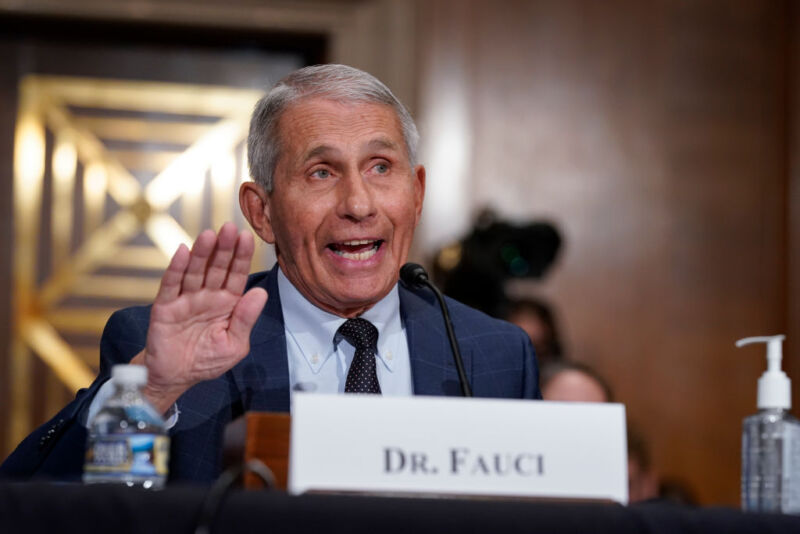
The US public's response to the pandemic has been chaotic. Some people have observed strict social distancing, happily went into lockdown when case counts got high, and got a vaccine as soon as it became available. Others were nearly the opposite, protesting any public health measures and refusing the vaccine. And a whole lot of the population ended up somewhere between the two extremes.
Obviously, for a complex response like that, multiple factors are probably in play, untangling them can be difficult. For example, conservatives in the US have received anti-vaccine messages from their political leaders, but that's coming on top of a long-term trend of mistrust toward scientific information.
This week, however, a bit of data has come out that does a fairly good job of untangling those complications. One study indicates that skepticism toward scientific information appears to be linked to whether people followed lockdown instructions from health authorities. And a survey indicates that people are more likely to try untested "cures" for COVID-19 if they watch right-wing news sources.
Mistrusting science
We'll cover the study first. It tracks the periods when many states implemented shelter-in-place orders early in the pandemic. The time frame at issue here (March 1 through April 19 of last year) was largely before the issue of pandemic control had become badly politicized (then-President Donald Trump didn't start tweeting that states should be "liberated" until April 17). To track compliance with these restrictions, the researchers obtained anonymized cell phone data. "Home" was defined as any location where the phone remained during the overnight period, allowing movement outside of the home to be tracked.
While this is an imperfect measurement, the data shows a clear trend: over the course of March, about 10 percent of the phones started remaining at home through the entire day. This was defined as complying with any local shelter-in-place orders, which were tracked at the county level.
The researchers then compared that to a proxy for respect for science: acceptance of the evidence for climate change. Through polling, they also had access to that at the county level.
There was a clear gap. In counties where acceptance of climate change was above the national mean, people were more likely to stay at home than average. In counties where that acceptance was below the mean, people were less likely to be sheltering in place than average. The effect was small but significant, with people in counties where climate change was mostly accepted being nearly 10 percent more likely stay at home.
Obviously, this is not a precision measurement of attitudes toward science in general, as acceptance of climate change was politicized well before the pandemic had even started. The researchers behind the paper adjusted for that by repeating the analysis only in counties that voted Republican, and they found that it held up (though Democratic-leaning counties still had lower levels of skepticism toward science). There was also no connection with the severity of the pandemic in the county at that time. But there was a clear correlation between rates of reported face-mask use and acceptance of climate change, suggesting sheltering in place wasn't the only pandemic measure affected by a skepticism toward science.
As an external check, the researchers also confirm that this relationship holds for a non-politicized public health measure: the rates of MMR vaccination. Those rates were also somewhat higher in counties with higher levels of acceptance of climate change. So, there seems to be a general relationship between acceptance of scientific information and a willingness to follow public health measures—one that's partly driven by politics, but exerts an independent influence as well.
Politics and public health
The political side of that equation was made clear by a recent YouGov/Economist poll that shows Republicans have turned against vaccines more generally. About a year earlier, prior to the availability of COVID-19 vaccines, a clear majority of self-labelled Republicans (59 percent) favored childhood vaccination mandates. But by this year, that number had dropped by 13 points; at 46 percent, this is no longer the majority opinion among Republicans. (Support for childhood vaccination went up slightly among Democrats, but the change was within the poll's margin of error.)
This is almost certainly because of a bleed-over of the consistent antimandate messaging among Republican politicians and media figures. Very few politicians have agitated against childhood vaccines so far. But if the opposition (currently at 35 percent) to these mandates among their base goes much further, opportunists will undoubtedly start doing so.
The role of conservative media figures was brought forward by a second poll, done by the University of Pennsylvania's Annenberg Public Policy. It looked into a few issues that you might call pandemic-related: opinions on Anthony Fauci and ivermectin use. The poll broke out people based on their chosen news sources, grouping them as follows: mainstream, social media, conservative, and very conservative. Examples of conservative media include sources like Fox News and Breitbart; very conservative sources include Newsmax and OAN.
A lot of conservative media has spent time attacking the infectious disease expert Dr. Fauci over the last few years, and that's clearly having an effect. When people were asked if they had confidence in Fauci, 87 percent of the viewers of mainstream news said they did. But that dropped to about half among conservative news viewers and was true for less than a third of very conservative sources.
reader comments
255